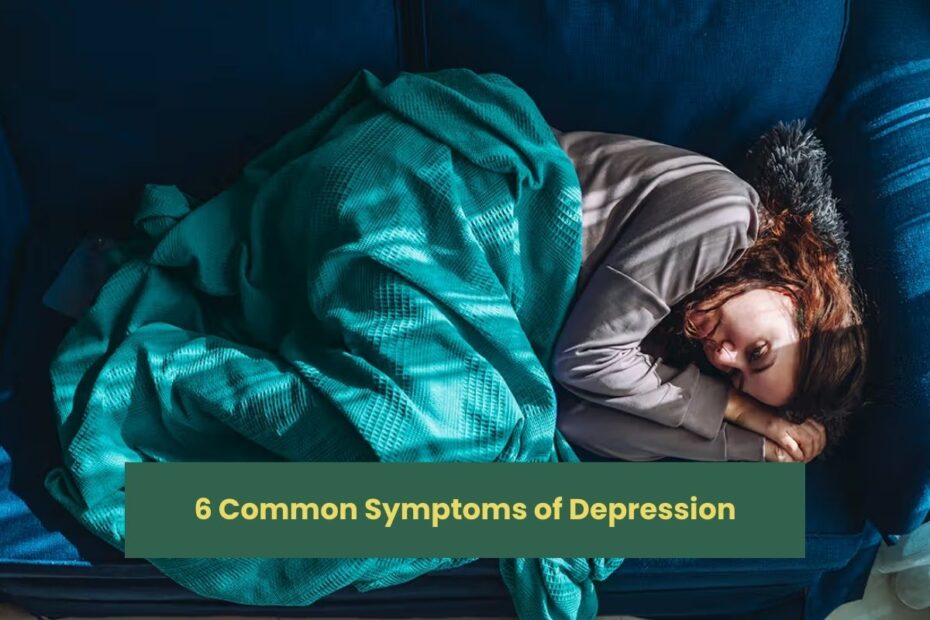Millions of people around the world suffer from depression, a complicated mental illness. It shows up in different ways and affects mental, social, and physical health. Recognizing the signs of sadness is important for getting help early and making sure it works. Here are six common signs of depression, each backed up by study and real-life experience:
6 Common Symptoms of Depression
1. Persistent Sadness or Low Mood
An overwhelming sadness or low mood that lasts most of the day, almost every day is one of the main signs of depression. This sign isn’t just short-term sadness; it’s a deep, long-lasting feeling that can be hard to get rid of. According to the Diagnostic and Statistical Manual of Mental Disorders, Fifth Edition (DSM-5), one of the most important signs of major depression disorder is feeling down most of the day for at least two weeks.
A study in The Journal of Clinical Psychiatry shows that this kind of chronic sadness can make it hard to do normal things like work, relationships, and personal things. It often feels too much and out of proportion to the situation, which makes it hard for people to find joy or happiness in things they used to enjoy.
2. Loss of Interest or Pleasure in Activities
Anhedonia, or losing interest in or pleasure from things that used to be fun, is a common sign of sadness. This can include things like hobbies, spending time with friends, or even taking care of yourself. The DSM-5 lists this symptom as a core feature of sadness and says it can cause people to stop doing things they used to enjoy and become socially isolated.
A study published in JAMA Psychiatry found that people with depression often lose a lot of their interests and pleasures, which can make them feel even more empty and bleak. This lack of interest isn’t just a short-term lull; it’s a deep, long-lasting lack of interest that affects many parts of life.
Also see;-8 Magnesium-Rich Foods That are Super Healthy
3. Fatigue and Decreased Energy
People who are depressed often feel tired all the time and have less energy than usual. People may feel tired all the time, even after getting enough rest or sleep. This tiredness can affect both the body and the mind, making even easy jobs seem impossible. According to a study in The American Journal of Psychiatry, depression is linked to tiredness because it can make it hard to sleep and make your general health worse.
Being this tired can make it very hard to do daily tasks, which can lower your quality of life and output. People who have it often find it harder to focus and finish jobs that they could handle before.
4. Changes in Sleep Patterns
Depression often messes up sleep habits, causing either insomnia (not being able to fall or stay asleep) or hypersomnia (sleeping too much). These changes in sleep can make other signs of sadness worse, like being tired and irritable. A study published in Sleep Medicine Reviews says that sleep problems can be a sign of sadness and can also make depression worse.
When someone is depressed, insomnia usually means waking up too early or having restless sleep, while hypersomnia can mean sleeping for long amounts of time and being too sleepy during the day. Both rhythms can mess up the body’s natural circadian rhythm, which can have an effect on health and function as a whole.
5. Changes in Appetite and Weight
Depression can cause big changes in weight and hunger, which can show up as either eating more or less. Some people may lose their hunger and lose weight as a result, while others may eat when they’re upset, which makes them gain weight. According to research released in Appetite, these changes in eating habits are closely linked to changes in how people feel and what they are feeling.
Cravings for high-calorie, sugary foods are common when you have a bigger appetite and gain weight. These foods can help temporarily but may make your sadness worse over time. On the other hand, losing your hunger can make you not eat enough, which can hurt your health even more.
6. Feelings of Worthlessness or Guilt
Feelings of worthlessness or too much sorrow are common in people who are depressed. People may have a skewed sense of self-criticism and poor self-evaluation, which can make them feel like they don’t deserve or are good enough. The DSM-5 says that these feelings are important signs of sadness because they have an effect on self-esteem and worth.
A study in The British Journal of Psychiatry found that people who feel guilty and useless are more likely to be severely depressed and have suicidal thoughts. These feelings can make you doubt yourself and keep you stuck in a cycle of bad thoughts and depression.
